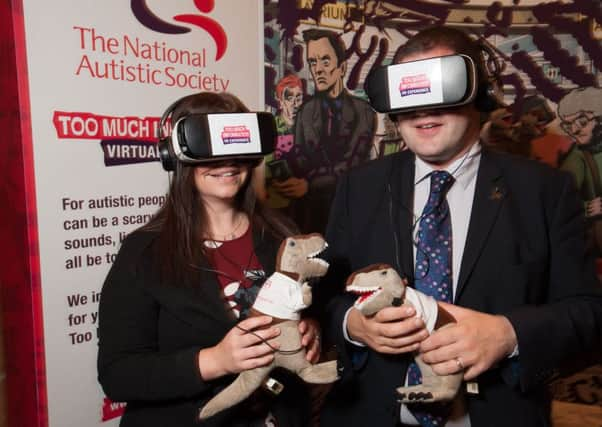View of the (virtual) reality of autism


Researchers, professionals, autistic people and family members came to the capital for the 11th XI Autism-Europe International Congress, which was hosted at the Edinburgh International Conference Centre by The National Autistic Society.
Taking place every three years, the Congress was last held in Budapest and it will be hosted in Paris in 2019. It was an honour to bring it to Scotland and showcase the groundbreaking work that is happening in this country. I was particularly pleased that 11 of the weekend’s presenters work for The National Autistic Society Scotland, and were selected by an independent panel to share their own knowledge on a range of topics - including education rights, developing social skills and cooking.
Advertisement
Hide AdAdvertisement
Hide AdA study group of professionals even travelled to Glasgow for the day to visit some of our projects and services, and learn first-hand about how we support and empower autistic people. I’m incredibly proud of my team; it’s gratifying to think that their experience will influence and inspire practice world-over.
In the run-up to the event, the Edinburgh International Conference Centre took significant steps to ensure our autistic visitors felt safe, happy and understood. In a short space of time it adapted physical elements of the building, making signage clearer and identifying quiet spaces for those who need them. It also made resources available online to help visitors plan ahead and encourage event organisers to consider adaptations.
Our chief executive, Mark Lever, gave the leading venue an Autism Friendly Award during the opening ceremony of the Congress, and I have to say it was very well deserved. The effort made by the Edinburgh International Conference Centre was appreciated by our guests, and will have a positive impact on its autistic visitors going forward.
We introduced the Autism Friendly Award – a standard for public spaces – because we know that small adjustments can often make a very big difference to the 58,000 autistic people living in Scotland. The Edinburgh International Conference Centre is only the second building in Edinburgh to achieve the award, with the other being Scottish Parliament. I hope more venues in the city will be inspired to consider the needs of autistic people, so that they are able to access and enjoy the community spaces that many of us take for granted.
Minister for Childcare and Early Years Mark McDonald MSP opened the Congress and took the opportunity to try out our new virtual reality experience, which was having its Scottish premiere.
By slipping on the futuristic headset, the Minister was transported to a world where lights are glaringly bright, music is unbearably loud, and people are quick to give judgemental looks. Sadly, this is the world that far too many autistic people inhabit: almost half told us that they sometimes don’t leave the house because they are worried about how others will react to them, and two thirds said that they feel socially isolated.
As an honorary member of its scientific committee, I had the role of hosting symposia at the Congress; encouraging debate and shared learning between experts from all over the world. It really did make for a fascinating weekend – but my real passion is for increasing understanding of the condition amongst members of the public. I believe that’s where our charity can make a difference – and given that just 15 per cent of autistic people think the public understands autism in a meaningful way, I know it’s a real challenge.
The new virtual reality experience is part of our Too Much Information campaign, which aims to increase public understanding of the condition that effects one in 100 people. This autumn we’re taking it on the road to reach communities across the country. It’s at intu Braehead today and tomorrow, and I hope shoppers will don the cutting-edge headset and view the centre through the eyes of an autistic person. By doing so they can gain some insight into how sensory overload can effect some autistic people, and why seemingly everyday places can be difficult and daunting.
Advertisement
Hide AdAdvertisement
Hide AdI’m really pleased that we’re the first charity to be using virtual reality technology in this way. I believe it underlines our commitment to finding innovative and impactful ways to raise public understanding of autism, as well as working with other professionals to advance our collective knowledge of the condition.
You could say we’re using virtual reality… to make autism friendly Scotland an absolute reality.
Jenny Paterson, director of The National Autistic Society Scotland